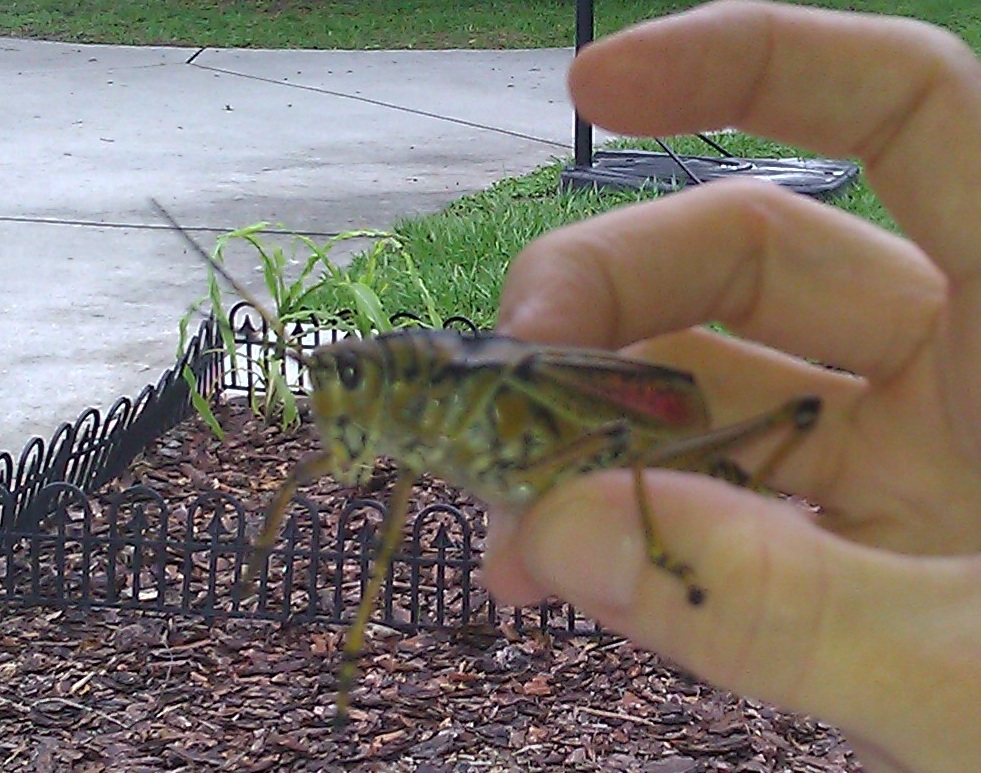 It started with a few small holes. The next day, entire leaves were shredded .
It started with a few small holes. The next day, entire leaves were shredded .
Something was munching down on my broom corn plants!
At first, I thought it might be caterpillars. I carefully lifted each corn leaf strand to see if any insects were lurking underneath.
Nothing.
What in the world? I couldn’t find any insects of any kind on my corn.
How do you fight an enemy you can’t see or identify? At that point, I had no idea what to do.
Luckily, by chance a few hours later, I noticed a huge grasshopper munching on my fiddle leaf fig tree on the front porch.
Lubber Grasshopper Invasion
Florida is home to the huge, rainbow colored lubber grasshopper. Adults regularly grow to 4 inches long.
They hiss and secrete a smelly spray when you try to pick them up. I haven’t been bit by one yet, though.
Literally nothing seems to want to eat them, including my backyard chickens which love large insects in general. They will even fight each other for regular sized grasshoppers. Once I dropped a lubber right in front of them. They just waddled away!
With no natural predators, these grasshoppers munch pretty much anything they like and broad leaf plants are their favorites.
Mmm, I wondered if this critter had been munching my corn?
The best way to get rid of lubber grasshoppers is to either drown them in soapy water or stomp on them.
Pesticides don’t really work although I wouldn’t go that route anyway.
I could only find two lubbers hanging around my front yard, so they both got stomped including the one in the picture above.
Since then, my corn plants have put out some new leaves and so far they remain free of any munch marks.
Since lubber grasshoppers are seasonal critters and not particularly plentiful this summer, hopefully I’ve seen the last one for awhile. I still can’t figure out why they don’t try munching my banana trees though. They have very broad and inviting leaves.







I have a serious predator cat that looks at lubbers as major outside toys! Beyond Moses’s I”ll occassionally chase one down and cut it in half…is that pest cardio workout. We never have to many on our N. FL property so feel lucky.
(sorry, i just can’t resist! i eat my weeds, i would definitely eat a plague of grasshoppers!)
mmm… grasshopper recipes:
One year, we had them at practically plague proportions at our house. They were everywhere. Not this year thankfully. Just a few here and there.
N Texas I think they have every variety n the world here.
do you drink coffee? try putting the left over grinds out. definatly works on snails. dont know about these tho. Best wishes.
Yikes!
hrm… after dinner snack?
I’ve heard that the amount of grasshoppers you have to deal with in a year depends on the amount of rain you’re getting. Personally, we have chickens so I don’t have to battle them in my garden.
You NEED chickens! Our most delicious, deepest reddish orange yolks come during grasshopper season.
I don’t know … these Lubbars are so big not sure a chicken would dare take one on! LOL 🙂